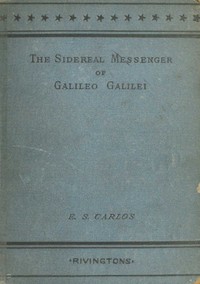The Sidereal Messenger of Galileo Galilei by Galileo Galilei and Johannes Kepler
Read now or download (free!)
| Choose how to read this book | Url | Size | ||||
|---|---|---|---|---|---|---|
| Read online (web) | https://www.gutenberg.org/ebooks/46036.html.images | 204 kB | ||||
| EPUB3 (E-readers incl. Send-to-Kindle) | https://www.gutenberg.org/ebooks/46036.epub3.images | 529 kB | ||||
| EPUB (older E-readers) | https://www.gutenberg.org/ebooks/46036.epub.images | 530 kB | ||||
| EPUB (no images, older E-readers) | https://www.gutenberg.org/ebooks/46036.epub.noimages | 111 kB | ||||
| Kindle | https://www.gutenberg.org/ebooks/46036.kf8.images | 591 kB | ||||
| older Kindles | https://www.gutenberg.org/ebooks/46036.kindle.images | 569 kB | ||||
| Plain Text UTF-8 | https://www.gutenberg.org/ebooks/46036.txt.utf-8 | 190 kB | ||||
| Download HTML (zip) | https://www.gutenberg.org/cache/epub/46036/pg46036-h.zip | 509 kB | ||||
| There may be more files related to this item. | ||||||
Similar Books
About this eBook
| Author | Galilei, Galileo, 1564-1642 |
|---|---|
| Author | Kepler, Johannes, 1571-1630 |
| Translator | Carlos, Edward Stafford |
| LoC No. | 07005111 |
| Title |
The Sidereal Messenger of Galileo Galilei and a Part of the Preface to Kepler's Dioptrics Containing the Original Account of Galileo's Astronomical Discoveries |
| Note | Reading ease score: 53.6 (10th to 12th grade). Somewhat difficult to read. |
| Credits |
Produced by David Edwards, Turgut Dincer and the Online Distributed Proofreading Team at http://www.pgdp.net (This file was produced from images generously made available by The Internet Archive) |
| Summary | "The Sidereal Messenger of Galileo Galilei" by Galileo Galilei is a scientific publication written in the early 17th century. This work details Galileo's groundbreaking astronomical discoveries made through his improved telescope, which revolutionized the study of the cosmos. The text focuses on various celestial phenomena, including the observation of the Moon's surface and his discovery of Jupiter's satellites, which played a vital role in advancing the Copernican model of the solar system. The opening of the text introduces Galileo's passion for celestial observation, sparked by the invention of the telescope. It recounts his early successes, detailing the construction of his own telescope and the clarity it provided in observing the Moon's rugged surface, which contradicted the long-held belief in its smoothness. Additionally, Galileo expresses excitement over his observations of four previously unknown celestial bodies orbiting Jupiter, which he names the "Medicean Stars." He invites fellow astronomers to verify his findings, setting the stage for a transformative period in astronomy that challenged existing paradigms regarding the structure of the universe. (This is an automatically generated summary.) |
| Language | English |
| LoC Class | QB: Science: Astronomy |
| Subject | Astronomy -- Early works to 1800 |
| Subject | Jupiter (Planet) -- Satellites |
| Category | Text |
| EBook-No. | 46036 |
| Release Date | Jun 19, 2014 |
| Most Recently Updated | Jun 24, 2014 |
| Copyright Status | Public domain in the USA. |
| Downloads | 675 downloads in the last 30 days. |
| Project Gutenberg eBooks are always free! | |

